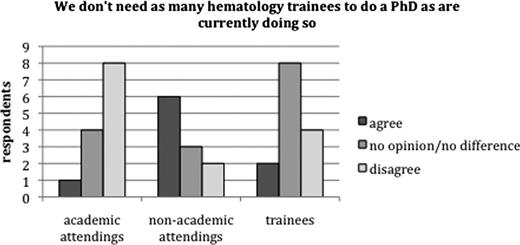Abstract
Abstract 2570
Physician-scientists spend a significant proportion of their time doing research, alongside clinical practice and teaching. Recruitment to academic medicine appears insufficient for workforce needs, with a perception of a 'crisis' in academic medicine (Andrew I. Schafer The Vanishing Physician Scientist 2009). Policy initiatives are in place to counter this recruitment problem and make an academic medicine career more attractive to trainees. Hematologists have a unique translational role in medicine and research, straddling the divide between laboratory and patient care. Since hematology may be inherently more academic compared to other medical specialties, this recruitment crisis may be more relevant to our specialty. Hematologists' experiences of research have been poorly reported. We employed mixed qualitative methods to explore hematologists' views on these issues, using focus groups (14 participants) to explore the experiences of research and higher degrees. Following themes from these, we used an online survey to gain quantitative data and obtained results from 39 hematologists in the local network in North East London serving approximately 4 million people, including two teaching hospitals. Among attendings, 72% had completed a research degree and 52% were in academic positions. Of trainees, 36% were enrolled in a higher degree program. The focus groups felt that hematology has a strong role in research because of the inherently lab-based aspects of the work, access to tissue for research and the history of translational research. The survey supported this, with most feeling that the lab experience facilitated the transition of hematologists to research, and 77% agreeing that 'compared to other medical specialities, hematology is more academic'. The focus groups explored the benefits of doing a research degree, such as a PhD. These included gains in critical thinking, data interpretation skills, a chance to study a topic in depth and CV development. Drawbacks included dislike of the work involved, financial loss and the stress of research. Some expressed concern about losing clinical skills during years of full-time research, whilst others felt that skills gained during research translated to better clinical acumen in the long term. The survey explored this further. 74% felt that whilst clinical acumen decreased during full-time research, this returned almost immediately on return to practice. 21% felt that clinical skills were better in the long term as a result of doing a PhD. Competition for non-academic hematology posts in the UK is low, and most doctors who do research will not become academics. However, there are expectations that hematologists need a research experience to further their careers, and most participants felt that there was greater pressure for hematologists to do research compared to other disciplines, with this pressure greater in London. We considered this perception of pressure in the context of UK research funding. The Royal College of Pathologists estimate that of ≤450 million spent on UK cancer research, ≤50-100 million are spent on hematological malignancies. Research funding is therefore out of proportion to the disease burden of blood cancers (8% of cancer deaths). London has 31% of UK academic doctors, 5 medical schools and receives 33% of UK research funding. These data help explain the greater pressure (or opportunity) for hematologists to undertake research, particularly in London. We explored views on recruitment to academic medicine. Whilst ‘becoming an academic doctor’ was rated as the strongest motivation for hematologists to do a PhD, doctors who subsequently did not proceed to an academic career benefitted from the research experience. Whilst academic doctors felt that more hematologists need to do research and become academic doctors, this view was not held by non-academic hematologists (p<0.05). In conclusion, hematologists consider their specialty to be more academic, with the nature of the work facilitating research. Particular motivations drive hematologists to undertake research. The pressure to do research may be higher in hematology compared to other areas of medicine, despite low competition for jobs overall. Concerns about loss of clinical skills do not appear to be justified. The perception of a recruitment problem within academic hematology varies depending on whether academic or non-academic hematologists are surveyed.
Disclosures:
Gribben:Roche: Consultancy; Celgene: Consultancy; GSK: Honoraria; Napp: Honoraria.
Author notes
*
Asterisk with author names denotes non-ASH members.
© 2010 by The American Society of Hematology
2010


